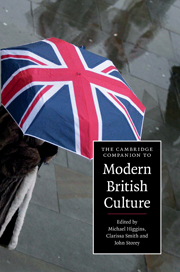Book contents
- Frontmatter
- Introduction: modern British culture
- 1 Becoming British
- 2 Language developments in British English
- 3 Schooling and culture
- 4 The changing character of political communications
- 5 Contemporary Britain and its regions
- 6 Contemporary British cinema
- 7 Contemporary British fiction
- 8 Contemporary British poetry
- 9 Theatre in modern British culture
- 10 Contemporary British television
- 11 British art in the twenty-first century
- 12 British fashion
- 13 Sport in contemporary Britain
- 14 British sexual cultures
- 15 British popular music, popular culture and exclusivity
- 16 British newspapers today
- 17 The struggle for ethno-religious equality in Britain: the place of the Muslim community
- Guide to further reading
- Index
1 - Becoming British
Published online by Cambridge University Press: 28 September 2010
- Frontmatter
- Introduction: modern British culture
- 1 Becoming British
- 2 Language developments in British English
- 3 Schooling and culture
- 4 The changing character of political communications
- 5 Contemporary Britain and its regions
- 6 Contemporary British cinema
- 7 Contemporary British fiction
- 8 Contemporary British poetry
- 9 Theatre in modern British culture
- 10 Contemporary British television
- 11 British art in the twenty-first century
- 12 British fashion
- 13 Sport in contemporary Britain
- 14 British sexual cultures
- 15 British popular music, popular culture and exclusivity
- 16 British newspapers today
- 17 The struggle for ethno-religious equality in Britain: the place of the Muslim community
- Guide to further reading
- Index
Summary
Introduction
Although the Greeks and the Romans used versions of the term 'Britain' to describe the islands and their Celtic inhabitants, it only became the name of a nation in the early eighteenth century. While it is true that the seeds of this invention can be found in earlier periods (the incorporation of Wales in 1536, James I of England being also James VI of Scotland in 1603), Britain was itself invented in 1707 by the Act of Union that united England and Scotland. Between 1801 and 1921 Ireland was added and the title changed to the United Kingdom. Following the division of Ireland in 1921 the name changed again, becoming the United Kingdom of Great Britain and Northern Ireland.
In her 1992 book Britons, Linda Colley details how the new invention had become firmly established by the time Victoria came to the throne in 1837. The Act of Union was itself followed by, for example, the composition of the unofficial British national anthem, 'Rule Britannia' in 1740, the official national anthem, 'God Save the King/Queen' in 1745 and the designing of the national flag, the Union Flag in 1801. She argues that conflict with France was perhaps the most significant factor in the formation of British self-identity: 'It was an invention forged above all by war. Time and time again, war with France brought Britons, whether they hailed from Wales or Scotland or England, into confrontation with an obviously hostile Other and encouraged them to define themselves collectively against it.'
- Type
- Chapter
- Information
- The Cambridge Companion to Modern British Culture , pp. 12 - 25Publisher: Cambridge University PressPrint publication year: 2010
- 2
- Cited by

